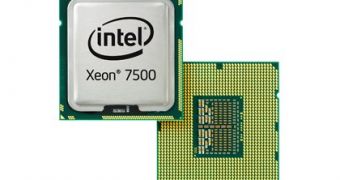Just two weeks after it made the formal introduction of its quad-core and six-core Xeon 5600 processing units, and in the wake of AMD's Magny Cours, Intel has once again grabbed the microphone to announce what it describes as the largest performance leap in Intel Xeon processor history. This leap comes in the form of the company's latest and strongest server CPUs, the Xeon 7500 Series, which are based on the Nehalem architecture and promise a performance increase of three times compared to Xeon 7400 chips.
The new CPUs have up to eight processing cores and Hyper Threading (16 threads), which means they can scale up to 32 cores and 64 threads in four-chip platforms or even 64 cores and 128 threads on eight-chip platforms. The most capable of the lot is the Xeon 7560, which has a clock frequency of 2.66GHz and 24MB of Intel Smart Cache memory, as well as Turbo Boost technology and four Intel QPI links. This chip is intended for super node high-performance computing applications in financial services and science. The thermal design power (TDP) of all processors can range between 95W and 130W.
In addition to their basic specs, all CPUs are built with over 20 reliability features, such as the Machine Check Architecture (MCA) Recovery, which enables a configuration to recover from system errors that would otherwise be fatal. This feature set makes Intel's new line capable of better protecting data integrity and minimizing planned downtime.
“The Xeon 7500 brings mission critical capabilities to the mainstream by delivering the most significant leap in performance, scalability and reliability ever seen from Intel,” said Kirk Skaugen, vice president of the Intel architecture group and general manager of Intel’s data center group. “This combination will help users push to new levels of productivity, and accelerate the industry’s migration away from proprietary architectures. We are democratizing high-end computing.”
The Xeon 7500 processors will be launched as part of systems from Dell, Fujitsu, Cray, IBM, SGI, HP, Cisco and Oracle, among others. These new servers are expected to also have a memory capacity up to four times higher (1TB in four-chip configurations) and an eightfold increase in memory bandwidth.

 14 DAY TRIAL //
14 DAY TRIAL //